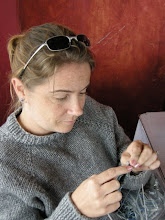I don't have a lot of time to write today, but I'd like to that the commenter from CARE. I think that you have a point regarding the balance between the good that can be done with the money and the possible harm done by food aid. I work in program development and fundraising right now, and totally understand regarding the loss of $46 million - you are right that someone (probably my organization!) will step in to fill the void. However, I still applaud CARE for doing what I think is the right thing, and making a decision that I believe will make their programming more effective.
This is a really sensitive and debatable topic. I definitely have my views on food aid, as any regular reader of this blog knows, and think that the entire food aid system should be dismantled, with the possible exception of emergency food aid. I do stand by my statement that those agencies, like my own, that accept food aid are being hypocritical. This comes from my view of the food aid system in general. I also certainly understand the argument the commenter made, even though I don't agree with it.
Anyone else want to chime in? Grandpa, I'm sure you have something to say on this.
Friday, August 17, 2007
Subscribe to:
Post Comments (Atom)

1 comment:
Way to go CARE!
For the most part, food aid is a bad idea. Emergency assistance during a disaster (flood, earthquake, drought) is one thing, but long term use of commodities to raise money for development will depress local markets for those commodities.
The U.S. food assistance program is more about supporting domestic commodity prices and shipping than it is about aid to recipient countries. The money would be much more efficiently used if it went to projects that helped to build local economies.
Food for development is really a “Catch 22". If you don’t participate you don’t have money. If You do participate you depress local food production. NGO’s should make every effort to get out of the food for development program. Recipient governments need to learn to say no thank you to such programs which in the long run are detrimental to their local economy.
In the 1950's the U.S. started the “Food For Peace Program”, which was more about dumping surplus commodities, that it acquired though domestic price support programs, than it was about aid to developing countries. It is time to say no to U.S. farmers and politicians and work to raise the funding for development programs through direct contributions from individual to the NGO’s.
And, while we’re questioning aid and development, how many organizations and people are needed in the aid economy? More of the funds would likely get to those in need if some of the NGO’s closed their doors and funneled there funds though the best developed programs.
Post a Comment